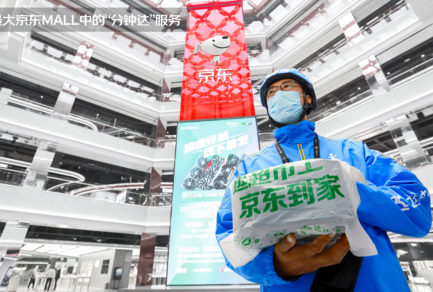Dec 1, 2020|
In-Depth Report: The JD Scientific Model in Supporting China’s Farmers and Agriculture
by Yuchuan Wang
In the five years after JD.com launched its rural e-commerce strategy in 2015, hundreds of millions of Chinese consumers have gotten used to receiving fresh produce the same day they place orders, thanks to JD.com’s nationwide cold chain logistics network.
The outbreak of COVID-19 posed great challenges towards the 600 million farmers across China who had to look to new avenues to sell and transport their produce. Leveraging e-commerce and logistics infrastructure, JD has been able to help sell 300 million items of agricultural products this year (as of October 2020). The company expects to increase the earnings of agricultural merchants on its platform by 50% in three years.
According to JD, transaction volume of agricultural products has surpassed RMB 500 billion yuan in the last five years, making JD.com a major sales channel for nationwide farm produce.
“Farm to Table”- JD Farm Model
Two years ago, JD started to explore the “JD Farm” model to advance traditional agriculture with the help of technology.
Aiming to build a digital and intelligent demonstration base for the production of high quality products, the project requires farms to produce based on a set of scientific standards. With the application of IoT, AI and blockchain technologies, JD Farm’s crops can be traced down to their origin, providing transparency to consumers.
Located in the southwest part of China, “Dai King Rice” is a Yunan province-based rice brand that owns a 1500 mu (~1 km2) farm. Through collaboration with JD Farm, planting, processing, warehousing and sales are all scientific and traceable. The IoT digital agricultural system helps monitor water quality, soil, climate, insect infestation and more. It forecasts natural hazards based on real time data and also suggests the application of fertilizer and pesticides.
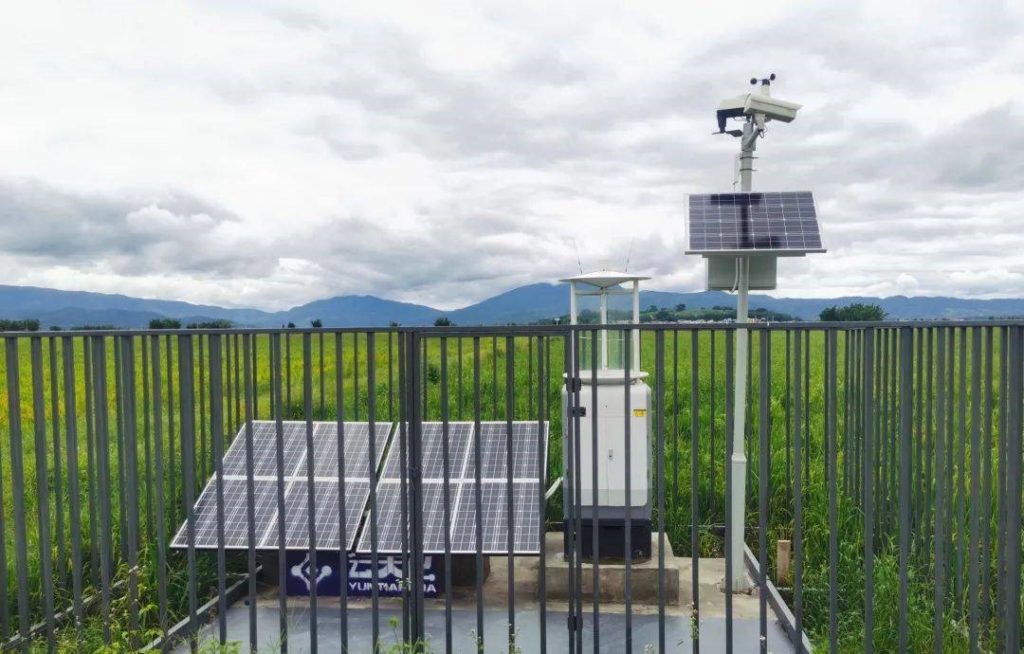
Smart monitor system applied in “Dai King Rice” farm
Jundaoxiang rice farm in Northeast China, an area known for producing the best quality rice in China, also introduced JD’s digital smart system to manage its farm. With a farming area of nearly 800,000 mu (~530 km2), drone inspection is applied to monitor the growth of weeds and provide advance warnings of insect infestation and disease.
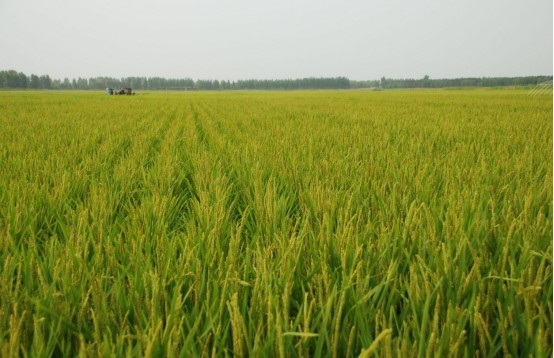
Jundaoxiang farm
In Loufan, Shanxi province, JD is helping the local government build a digital map to analyze the growth of key crops and forecast crop yield through satellite and remote sensing multispectral imaging technology by drones. In addition to helping Loufan digitize the agricultural production process, JD is determined to help sell the local products across the nation by opening up its logistics and supply chain technology and operations experience. The company is also promoting local supply chain development through the building of JD’s Loufan logistics center and cloud warehouse solution.
“Due to the long process of the traditional agriculture product supply chain, end consumers do not necessarily get the best price when purchasing agricultural products while growers may not get the best earnings,” said Zhiwei Qiao, head of JD Farm. “The JD Farm model provides an integrated solution from production to supply to sales. Relying on JD.com’s industrial resources, warehousing and distribution network, and technical advantages, we are able to control the quality of agricultural products from their place of origin, and help growers build brand awareness and earn more in the end.”
So far, JD Farm has established over 40 farm projects nationwide.
Sustainable Agricultural Support
Xisheng Li is a farmer in Wuyi, Hebei province. His family used to earn RMB 3,000 yuan (US$456) annually, purely relying on limited farm land to grow crops such as corn and wheat.
In 2016, JD built a free-range chicken farm in the economically disadvantaged county. The project provides free-interest loans to farmers to buy chicks. Once the birds have taken one million steps during the rearing process, calculated by a specially designed pedometer that is equipped to each chicken’s foot, JD will help sell them nationwide.
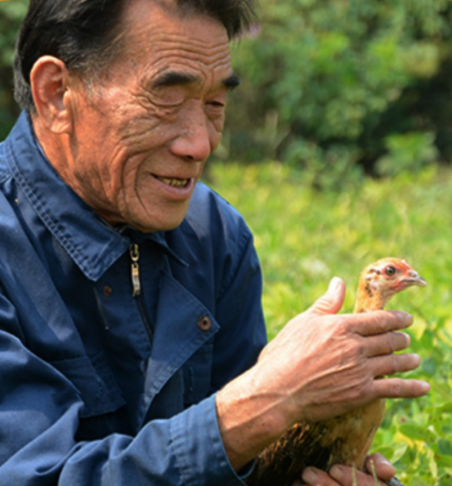
Xisheng Li in JD’s running chicken park
Li was among the first farmers to participate in JD’s “Running Chicken Initiative”. In 2020, Li expects to earn about RMB 20,000 yuan (US$3038) through this project. Till today, the project has benefited 114 villages in the county and helped 1,600 poor families, improving their quality of life and helping to remove Wuyi from China’s national poverty list.
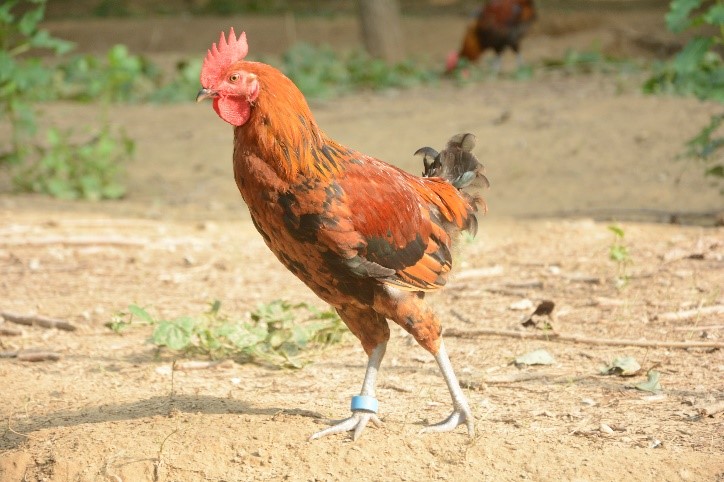
JD running chicken
In 2019, JD launched the expanded initiative “Running Pig” projects in Benxi, Liaoning province and Qingdao, Shandong province, with a total area of 1,600 mu (~1 km2). The project raises 100,000 pigs annually and has already helped 540 poor families in the areas. JD’s “Flying Pigeon” project in Hebei and Xinjiang has also helped a total of over 3,000 needy families.
“JD’s agriculture support projects provide a training opportunity to local farmers, which enables them to make a living with dignity and sustainably,” said Yishen Tang, head of JD Fresh, JD.com’s online fresh food business.
On June 12th this year, JD announced it will further integrate its technology and service infrastructure with omnichannel resources to support agricultural product sales. Under the plan, JD provides supply chain, logistics, technology and retail services, as well as marketing tools such as livestreaming, flash sales, access to SEVEN FRESH offline supermarkets and more.
Food Safety and Blockchain Technology
The overuse of fertilizer, environmental deterioration, and rapid population increase have caused soil quality problems. Understanding Chinese consumers’ deep concern for food safety, in December 2018, JD partnered with Japanese chemical manufacturing giant Mitsubishi Chemical and opened a hydroponic “plant factory” in the Tongzhou district of Beijing. Spanning an area of 11,040 square meters, it incorporates a hydroponic culturing system and can produce spinach, cabbage, red and green lettuce, coriander, and more.
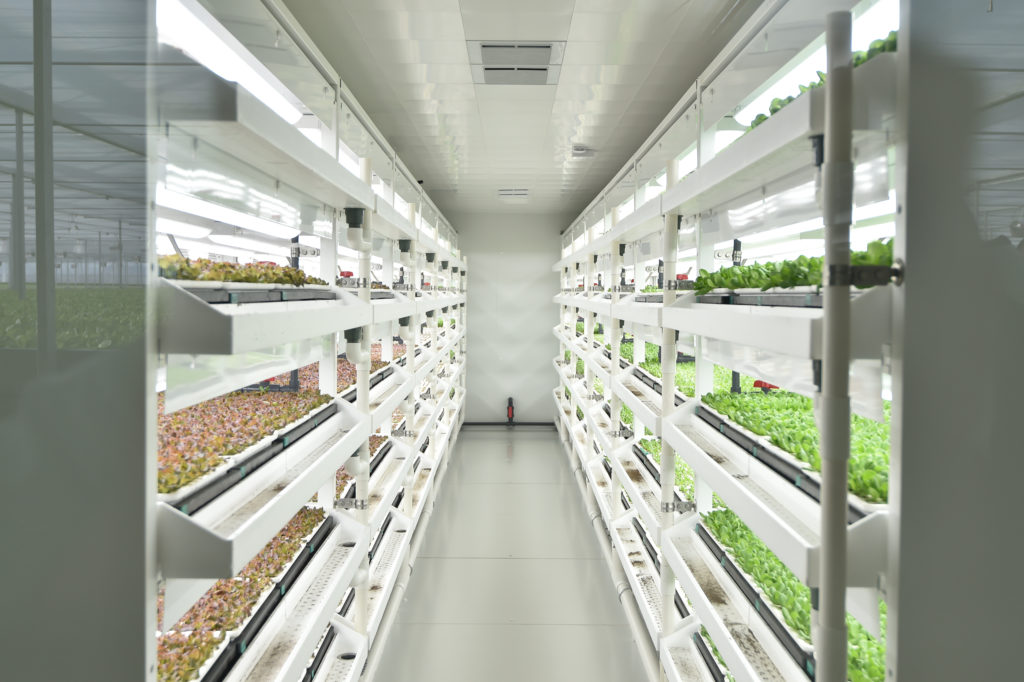
JD Botanical Factory
Temperature, humidity, light, and liquid fertilizer are automatically controlled by system, enabling more standardized production of high quality vegetables.
All crops produced at JD’s botanical factory can be delivered to consumers’ tables as soon as the same day they are cropped leveraging the company’s cold chain logistics network and e-commerce platform, and also offline stores such as its SEVEN FRESH supermarket.
JD Botanical Factory
Another way to ensure food quality is blockchain technology, which is widely used at JD to transparently trace the origin of food. For example, by scanning the QR code on each bag of “Dai King Rice”, consumers have full visibility into the origin, production, logistics information, and more. Since early 2018, JD customers have been able to review details about the rearing process for every JD running chicken they buy.

Blockchain traced information of JD’s running chicken
“Information will be collected and traced by blockchain from rearing, feeding and all the way to shipping and delivery,” said Wenjing Liu, a blockchain specialist at JD Digits. “And it can’t be altered without authorization.”
A Better Growth Path
“To better sell local agricultural specialties from their origins is a problem that needs to be tackled from a long term perspective, which requires transformation from two aspects,” said Yishen Tang. “On the one hand, COVID-19 has accelerated the transition from buying offline to online for fresh produce. On the other hand, farmers are gradually becoming more open-minded, shifting from waiting for dealers to buy to actively selling online. These processes also help agricultural products gain extra value.”
As of October 2020, marketplace stores selling agricultural products on JD’s e-commerce platform had increased 2.4 times since 2017. Transaction volume of agricultural products in 2020 on JD is expected to increase 63 times compared with in 2014.
The ability to transport agricultural products is highly dependent on JD’s self-built warehousing and logistics network. Till now, the company operates 50 cold chain warehouses that enable cold chain fulfillment in 300 cities, effectively connecting the farm with consumers’ tables.
In addition, over 100,000 livestreams selling agricultural products have been completed on JD’s platform, attracting over 100 million viewers. E-commerce livestreaming has already helped a large number of farmers, but there are many more who haven’t explored this technology yet. JD holds regular livestreaming training sessions and other trainings to help more farmers, entrepreneurs and local officials get acquainted with the technology. JD had offered over 1,000 such trainings in 28 provinces, municipalities and autonomous regions this year.
With the development of cold chain logistics and related technology, JD’s e-commerce will enable more agricultural products to be sold nationwide and globally.

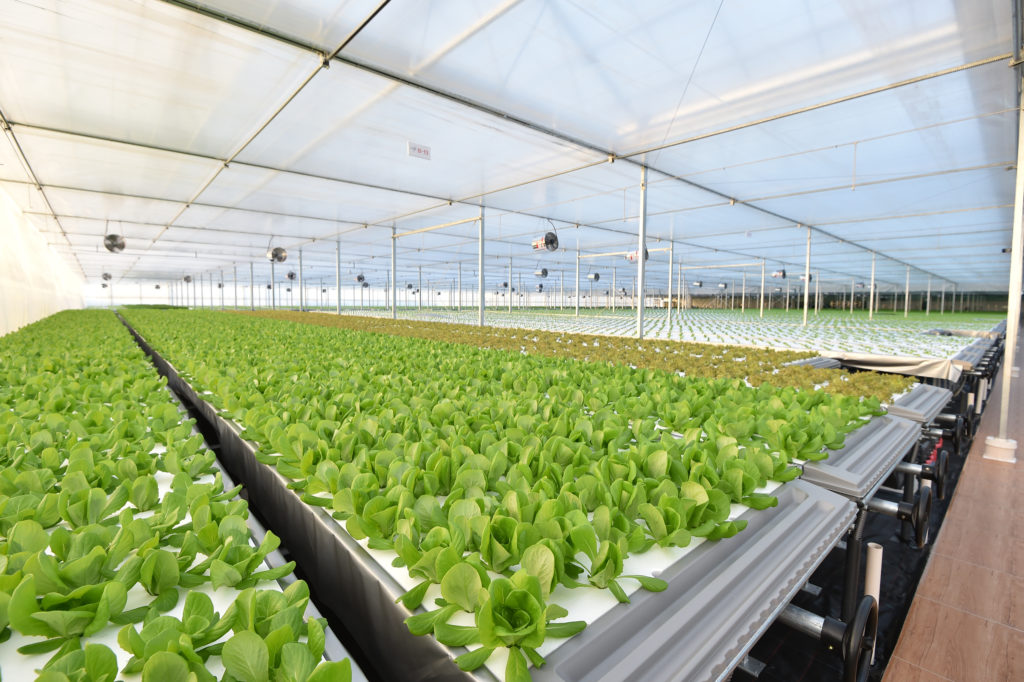
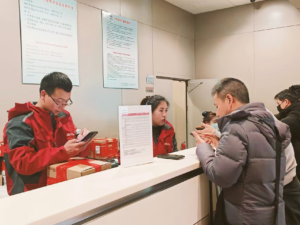 This Harbin tourism boom has also spurred a surge in sales of winter apparel. JD.com’s data indicates a rapid growth in the sales of warm clothing items such as down jackets, snow boots, and thermal underwear between January 1st and 7th. The sales growth is especially pronounced in southern provinces and cities such as Jiangsu, Zhejiang, Guangdong, Sichuan, and Shanghai. Notably, tall snow boots registered a 206% year-on-year increase in transactions, while padded cotton caps and thickened long down jackets soared by 158% and 134%, respectively. Beyond clothing, travel gear has also seen a considerable uptick, with a 98% year-on-year growth in transactions for large suitcases and travel backpacks in these southern regions.
This Harbin tourism boom has also spurred a surge in sales of winter apparel. JD.com’s data indicates a rapid growth in the sales of warm clothing items such as down jackets, snow boots, and thermal underwear between January 1st and 7th. The sales growth is especially pronounced in southern provinces and cities such as Jiangsu, Zhejiang, Guangdong, Sichuan, and Shanghai. Notably, tall snow boots registered a 206% year-on-year increase in transactions, while padded cotton caps and thickened long down jackets soared by 158% and 134%, respectively. Beyond clothing, travel gear has also seen a considerable uptick, with a 98% year-on-year growth in transactions for large suitcases and travel backpacks in these southern regions.
 JDD Series: JD Health’s Intelligent Health Ecosystem
JDD Series: JD Health’s Intelligent Health Ecosystem
